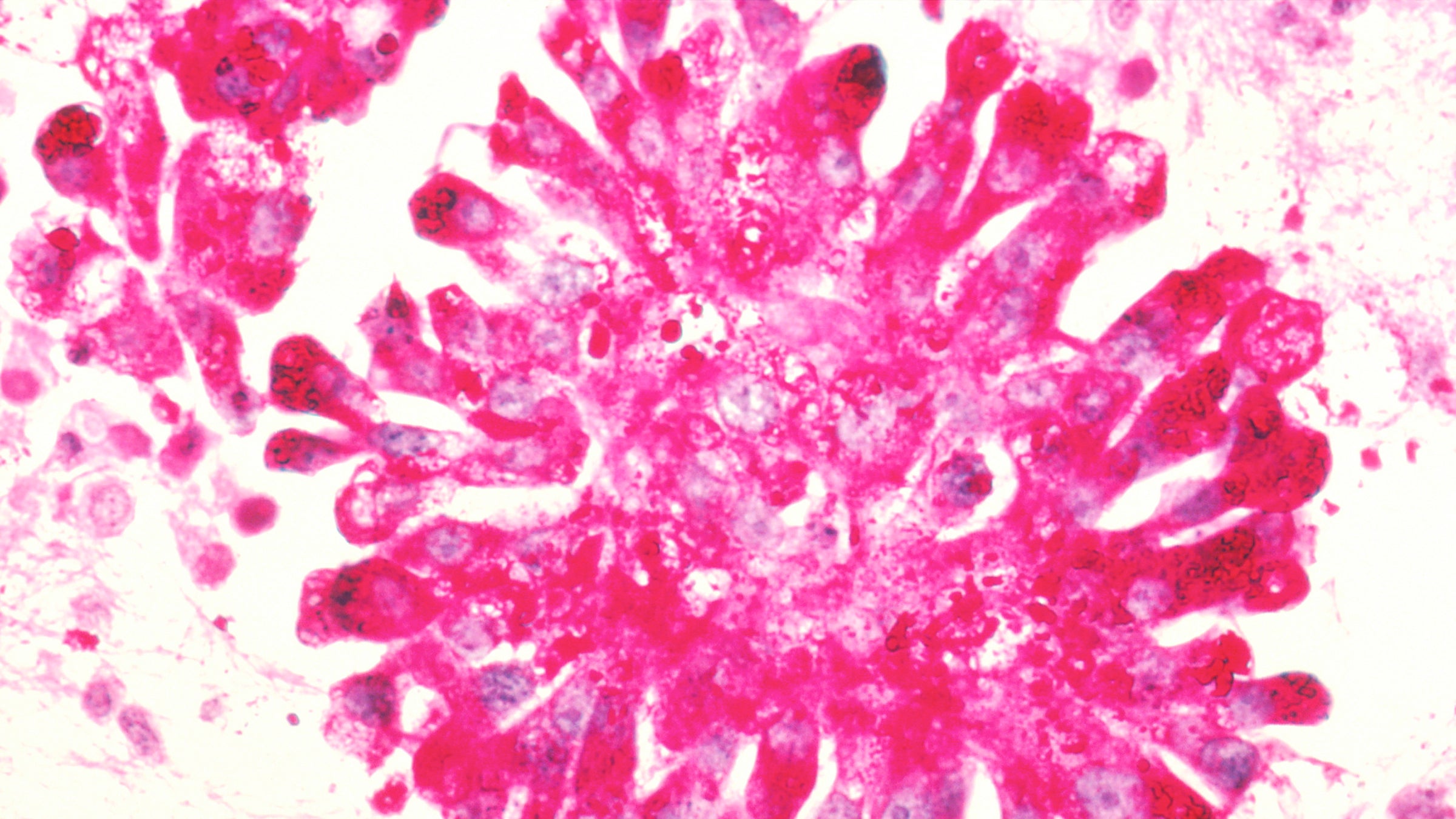Is cancer a survival tactic on the part of our cells? A physicist shares his theory
Listen
This slide from the Dr. Lance Liotta Laboratory shows Ewing's sarcoma
The quest for a cure for cancer has become such a fixation of modern medicine that the very phrase has taken on a second life in modern parlance, denoting alternatively an earth-shattering achievement and an impossibly ambitious goal. But one scientist is, controversially, attempting to turn that dynamic on its head — suggesting that searching for a “cure” may be altogether impossible, or at least a fundamental misunderstanding of what cancer is.
Paul Davies, from Arizona State University in Tempe, isn’t just an unusual cancer researcher in terms of his beliefs, he’s also a respected physicist, of all things. He says he was contacted about eight years ago by a deputy at the National Cancer Institute because they were, as he puts it, “stuck.”
“She said something like ‘We’re spending all this money on cancer research and we’re stuck. Can physicists help?'” said Davies. Davies agreed to put a fresh set of eyes on an age old problem, but soon came to a revelation that is probably familiar to any layperson that has tried to wrap their head around the second most common cause of death in the U.S.
“Surely after all this research and all this money’s been spent and the million published papers you could say ‘What is cancer? Why does it exist? How does it fit into the great story of life?’ and get an answer,” said Davies. “And it turns out that you can’t. What I’ve been trying to do is answer the question, ‘What is cancer?'”
So Davies decided to focus on creating a grand theory that could answer that burning question. He began with the observation that, since nearly all complex organisms get cancer, it must have very deep biological roots — perhaps even predating multi-cellular organisms altogether. All organisms are descended from simple microbes that replicate at will and are, effectively, immortal. But during the formation of complex multi-cellular organisms, like humans, that endless replication and immortality was abandoned in favor of specialized reproductive cells, like sperm and ova. Most of the rest of the cells that make up our body don’t spontaneously exist and reproduce — they live, they die or regenerate at tightly programmed intervals, part of a process called apoptosis. It’s a process that allows humans and other organisms to form advanced organs and limbs built out of an otherwise chaotic collection of microscopic cells.
Cancer could be described as the absence of apoptosis, and Davies has theorized that it could be a function of cells that dates back to those days of early microbes.
“It’s important to understand in biology that evolution builds on what was there before. And so cells come with a sort of core functionality which goes back even before the multi-cellular world,” said Davies, referring to that early state of constant replication. “If something goes a little bit wrong, and in particular if a cell is threatened…then they have this in-built ‘safe mode,’ as I’m calling it, that they can default back to.”
He suggests that carcinogens, the aging process and other factors can put stress on the microenvironment that our cells inhabit, that could be triggering the aforementioned “safe mode” and subsequent development of out-of-control, tumorous cell growth. Say that Davies is right, and cancer is some kind of a billion and a half year old primordial survival tactic on the part of our cells — What would that mean for cancer research?
Fundamentally, he believes scientists should be looking backwards, at the world that existed during the dawn of the first multi-cellular organisms. “The one thing we do know is that [the Earth] had very low levels of oxygen in the atmosphere. The organisms that were living at that time were living in a hypoxic world,” said Davies. “It’s what cancer likes. So, one way of tackling cancer is to make it feel uncomfortable in the modern world, that is to give it lots of oxygen.” He recommends researchers begin investigating the effectiveness of unconventional treatments on cancer patients that fit his hypothesis, like hyperbaric chamber therapy — usually used to treat people with carbon monoxide poisoning. Davies also believes that restricting sugar, a key ingredient in the fermentation process that is necessary for cellular growth, and that a low-sugar diet could help stall the advancement of cancer.
Davies’ recommendations have generated a great deal of controversy amongst traditional cancer researchers, but he views that as part of his job — he was hired to provide fresh, unconventional perspectives.
“If I was just going to say, ‘Well, I just rediscovered what you guys knew all along,’ that’s no good is it?” asks Davies. “The great virtue of bringing in people who are fresh, a fresh pair of eyes, is that they look at these things…and try to weave them together, connect the dots, in a novel way and tell a different narrative about the same things.”
WHYY is your source for fact-based, in-depth journalism and information. As a nonprofit organization, we rely on financial support from readers like you. Please give today.



